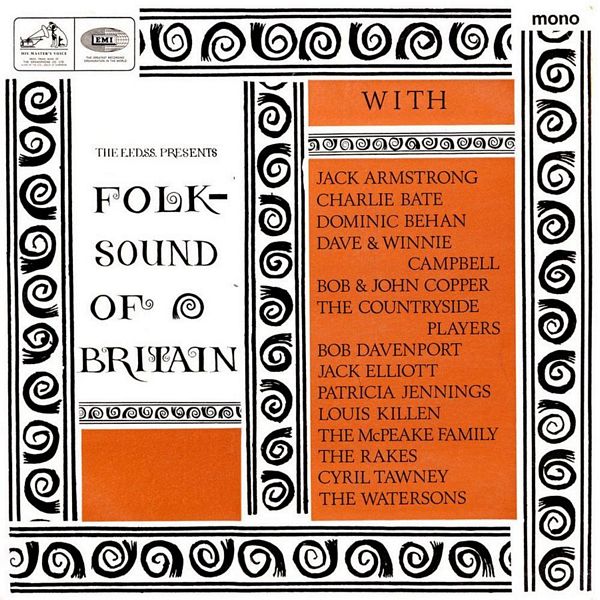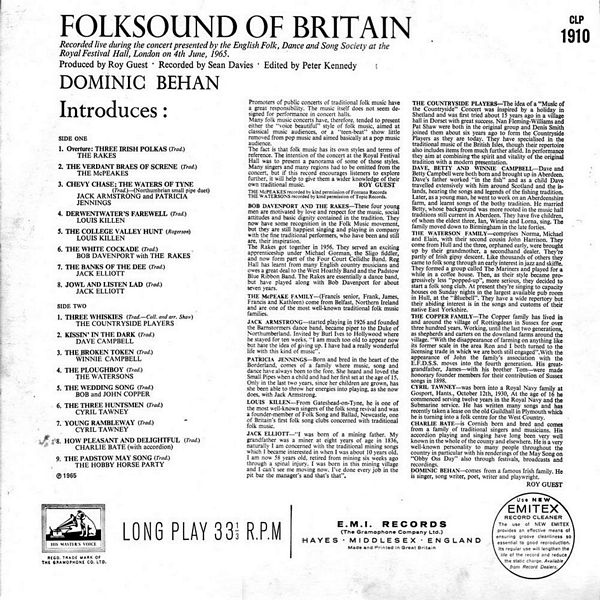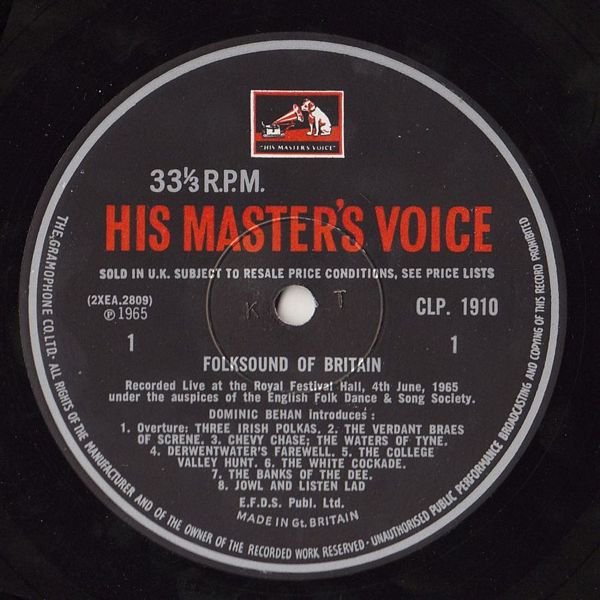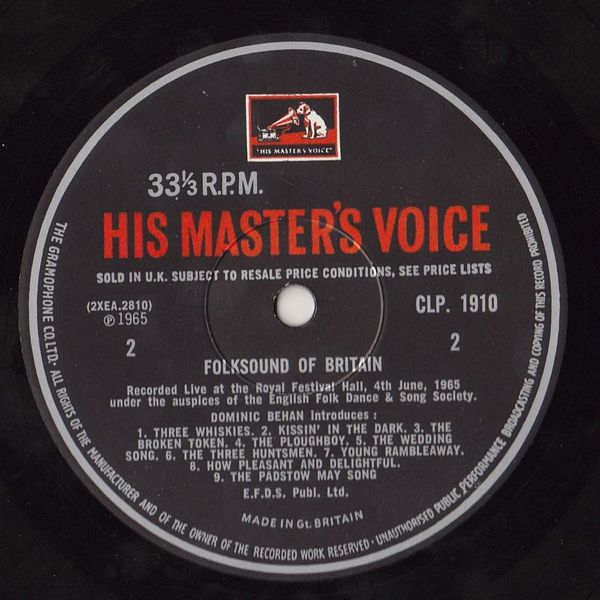
 |


 |
Sleeve Notes
Promoters of public concerts of traditional folk music have a great responsibility. The music itself does not seem designed for performance in concert halls.
Many folk music concerts have, therefore. tended to present either the "voice beautiful" style of folk music. aimed at classical music audiences, or a "teen-beat" show little removed from pop music and aimed basically at a pop music audience.
The fact is that folk music has its own styles and terms of reference. The intention of the concert at the Royal Festival Hall was to present a panorama of some of those styles. Many singers and many regions had to be omitted from the concert, but if this record encourages listeners to explore further, it will help to give them a wider knowledge of their own traditional music.
ROY GUEST
THE McPEAKES recorded by kind permission of Fontana Records
THE WATERSONS recorded by kind permission of Topic Records.
BOB DAVENPORT AND THE RAKES — These four young men are motivated by love and respect for the music, social attitudes and basic dignity contained in the tradition. They now have some recognition in the Folk Music movement. but they are still happiest singing and playing in company with the fine traditional performers, who have been and still are, their inspiration.
The Rakes got together in 1956. They served an exciting apprenticeship under Michael Gorman, the Sligo fiddler, and now form part of the Four Court Ceilidhe Band. Reg Hall has learnt from many English country musicians and owes a great deal to the West Hoathly Band and the Padstow Blue Ribbon Band. The Rakes are essentially a dance band. but have played along with Bob Davenport for about seven years.
THE McPEAKE FAMlLY — (Francis senior, Frank. James. Francis and Kathleen) come from Belfast, Northern Ireland and are one of the most well-known traditional folk music families.
JACK ARMSTRONG started playing in 1926 and founded the Barnstormers dance band, became piper to the Duke of Northumberland. Invited by Burl Ives to Hollywood where he stayed for ten weeks. "I am much too old to appear now but hate the idea of giving up. I have had a really wonderful life with this kind of music".
PATRICIA JENNINGS — Born and bred in the heart of the Borderland, comes of a family where music, song and dance have always been to the fore. She heard and loved the Small Pipes when a child and had her first set at the age of 15. Only in the last two years, since her children are grown. has she been able to throw her energies into playing, as she now does, with Jack Armstrong.
LOUIS KILLEN — From Gateshead-on-Tyne, he is one of the most well-known singers of the folk song revival and was a founder-member of Folk Song and Ballad, Newcastle. one of Britain's first folk song clubs concerned with traditional folk music.
JACK ELLIOTT — "I was born of a mining father. My grandfather was a miner at eight years of age in 1836. naturally I am concerned with the traditional mining songs which I became interested in when I was about 10 years old. I am now 58 years old, retired from mining six weeks ago through a spinal injury. I was born in this mining village and I can't see me moving now. I've done every job in the pit bar the manager's and that's that".
THE COUNTRYSIDE PLAYERS — The idea of a "Music of the Countryside" Concert was inspired by a holiday in Shetland and was first tried about 15 years ago in a village hall in Dorset with great success. Nan Fleming-Williams and Pat Shaw were both in the original group and Denis Smith joined them about six years ago to form the Countryside Players as they are today. They have specialised in the traditional music of the British Isles, though their repertoire also includes items from much further afield. In performance they aim at combining 'the spirit and vitality of the original tradition with a modern presentation.
DAVE, BETTY AND WINNIE CAMPBELL — Dave and Betty Campbell were both born and brought up in Aberdeen. Dave's father worked "in the fish" and as a child Dave travelled extensively with him around Scotland and the islands, hearing the songs and legends of the fishing tradition. Later, as a young man, he went to work on an Aberdeenshire farm, and learnt songs of the bothy tradition. He married Betty, whose background was more rooted in the music hall traditions still current in Aberdeen. They have five children, of whom the eldest three, Ian, Winnie and Lorna, sing. The family moved down to Birmingham in the late forties.
THE WATERSON FAMILY comprises Norma, Michael and Elain, with their second cousin John Harrison. They come from Hull and the three, orphaned early, were brought up by their grandmother, a secondhand dealer. They're partly of Irish gipsy descent. Like thousands of others they came to folk song through an early interest in jazz and skiffle. They formed a group called The Mariners and played for a while in a coffee house. Then, as their style became progressively less "popped-up", more serious, they decided to start a folk song club. At present they're singing to capacity houses on Sunday nights in the largest available pub room in Hull, at the "Bluebell". They have a wide repertory but their abiding interest is in the songs and customs of their native East Yorkshire.
THE COPPER FAMILY — The Copper family has lived in and around the village of Rottingdean in Sussex for over three hundred years. Working, until the last two generations, as shepherds and carters on the downland farms around the village. "With the disappearance of farming on anything like its former scale in the area Ron and I both turned to the licensing trade in which we are both still engaged". With the appearance of John the family's association with the E.F.D.S.S. moves into the fourth generation. His great-grandfather, James — with his brother Tom — were made honorary founder members for their contribution of Sussex songs in 1898.
CYRIL TAWNEY was born into a Royal Navy family at Gosport, Hants., October 12th, 1930. At the age of 16 he commenced serving twelve years in the Royal Navy and the Submarine service. He has written many songs and has recently taken a lease on the old Guildhall in Plymouth which he is turning into a folk centre for the West Country.
CHARLIE BATE is Cornish born and bred and comes from a family of traditional singers and musicians. His accordion playing and singing have long been very well known in the whole of the county and elsewhere. He is a very well-known personality to many people throughout the country in particular with his renderings of the May Song on "Obby Oss Day" also through festivals, broadcasts and recordings.
DOMINIC BEHAN comes from a famous Irish family. He is singer, song writer, poet, writer and playwright.
ROY GUEST